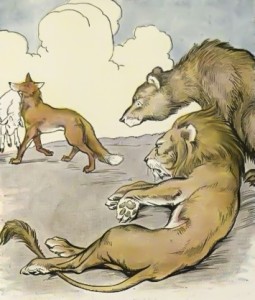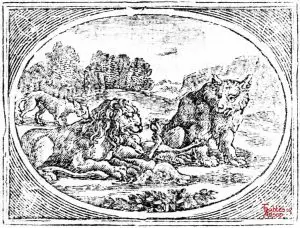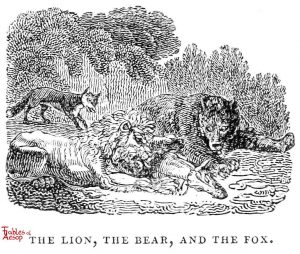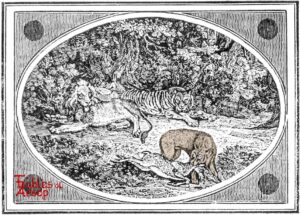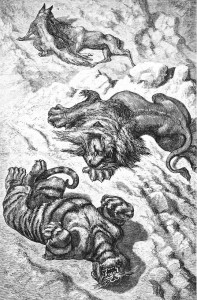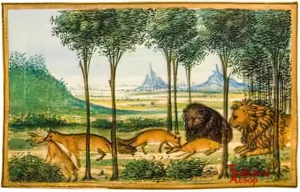A Lion battled a Bear (or Tiger) for a killed Fawn. When both were too tired to move a Fox came and made off with the prey. Too bad; should have shared.
Sometimes one man toils while another profits.

Aesop For Children (The Lion, The Bear, and The Fox)
Just as a great Bear rushed to seize a stray kid, a Lion leaped from another direction upon the same prey. The two fought furiously for the prize until they had received so many wounds that both sank down unable to continue the battle.
Just then a Fox dashed up, and seizing the kid, made off with it as fast as he could go, while the Lion and the Bear looked on in helpless rage.
“How much better it would have been,” they said, “to have shared in a friendly spirit.”
Moral
Those who have all the toil do not always get the profit.

Townsend version
A lion and a Bear seized a Kid at the same moment, and fought fiercely for its possession. When they had fearfully lacerated each other and were faint from the long combat, they lay down exhausted with fatigue. A Fox, who had gone round them at a distance several times, saw them both stretched on the ground with the Kid lying untouched in the middle. He ran in between them, and seizing the Kid scampered off as fast as he could. The Lion and the Bear saw him, but not being able to get up, said, “Woe be to us, that we should have fought and belabored ourselves only to serve the turn of a Fox.”
Moral
It sometimes happens that one man has all the toil, and another all the profit.

Samuel Croxall (The Lion, the Bear, and the Fox)
A LION and a Bear fell together by the ears, over the carcase of a Fawn, which they found in the forest, their title to him being to be decided by force of arms. The battle was severe and tough on both sides, and they held it out, tearing and worrying one another so long, that, what with wounds and fatigue, they were so faint and weary, they were not able to strike another stroke. Thus, while they lay upon the ground, panting and lolling out their tongues, a Fox chanced to pass by that way, who, perceiving how the case stood, very impudently stept in between them, seized the booty which they had all this while been contending for, and carried it off. The two combatants, who lay and beheld all this, without having; strength enough to stir and prevent it, were only wise enough to make this reflection: Behold the fruits of our strife and contention! that villain, the Fox, bears away the prize, and we ourselves have deprived each other of the power to recover it from him.
THE APPLICATION
When people go to law about an uncertain title, and have spent their whole estate in the contest, nothing is more common than for some little pettifogging attorney to step in and to secure it to himself. The very name of law seems to imply equity and justice, and that is the bait which has drawn in many to their ruin. Others are excited by their passions, and care not if they destroy themselves, so they do but see their enemy perish with them. But, if we lay aside prejudice and folly, and think calmly of the matter, we shall find, that going to law is not the best way of deciding differences about property; it being, generally speaking, much safer to trust to the arbitration of two or three honest, sensible neighbours, than, at a vast expence of money, time and trouble, to run through the tedious, frivolous forms, with which, by the artifice of greedy lawyers, a court of judicature is contrived to be attended, It has been said, that if mankind would lead moral, virtuous lives, there would be no occasion for divines; if they would but live temperately and soberly, that they would never want physicians; both which assertions, though true in the main, are yet expressed in too great a latitude. But one may venture to affirm, that if men. preserved a strict regard to justice and honesty in their dealings with each other, and upon any mistake or misapprehension, were always ready to refer the matter to disinterested umpires of acknowledged judgment and integrity, they could never have the least occasion for lawyers. When people have gone to law, it is rarely to be found but one or both parties are either stupidly obstinate, or rashly inconsiderate. For, if the case should happen to be be intricate, that a man of common sense could not distinguish, who had the best title, how easy would it be to have the opinion of the best counsel in the land, and agree to determine it by that? If it should appear dubious even after that, how much better would it be to divide the thing in dispute, rather than go to law, and hazard the losing, not only of the whole, but costs and damages into the bargain?

Thomas Bewick (The Lion, The Tiger, and The Wolf)
A Lion and a Tiger, at the same instant seized on a young Fawn, which they immediately killed. This they had no sooner performed, than they fell to fighting, in order to decide whose property it should be. The battle was so obstinate, that they were both compelled, by weariness and loss of blood, to desist and lie down breathless and quite disabled. A Wolf passing that way, perceiving how the case stood, very impudently stepped up and seized the booty, which they had all this while been contending for, and carried it off. The two combatants, who beheld this without being able to prevent it, could only make this reflection: How foolish, said they, has been our conduct! Instead of being contented, as we ought, with our respective shares, our senseless rage has rendered us unable to prevent this rascally Wolf from robbing us of the whole.
APPLICATION.
When people go to law about an uncertain title, and have spent the value of their whole estate in the contest, nothing is more common than to find that some unprincipled attorney has secured the object in dispute to himself. The very name of law seems to imply equity and justice, and that is the bait which has drawn in many to their ruin. If we would lay aside passion, prejudice, and folly, and think calmly of the matter, we should find that going to law is not the best way of deciding differences about property; it being, generally speaking, much safer to trust to the arbitration of two or three honest sensible neighbours, than at a vast expence of money, time, and trouble, to run through the tedious frivolous forms, with which, by the artifices of greedy lawyers, a court of judicature is contrived to be attended. Or if a case should happen to be so intricate that a man of common sense cannot distinguish who has the best title, how easy would it be to have the opinion of the best counsel in the land, and agree to abide by his decision. If it should appear dubious, even after that, how much better would it be to divide the thing in dispute, rather than go to law, and hazard the losing, not only of the whole, but costs and damages into the bargain!

JBR Collection (The Lion, The Tiger, and the Fox)
A Lion and a Tiger happened to come together over the dead body of a Fawn that had been recently shot. A fierce battle ensued, and as each animal was in the prime of his age and strength, the combat was long and furious. At last they lay stretched on the ground panting, bleeding, and exhausted, each unable to lift a paw against the other. An impudent Fox coming by at the time, stepped in and carried off before their eyes the prey on account of which they had both suffered so much.

L’Estrange version
There was a lion and a bear had gotten a fawn betwixt them, and there were they at it tooth and nail, which of the two should carry’t off. They fought it out, till they were e’en glad to lie down, and take breath. In which instant, a fox passing that way, and finding how the case stood with the two combatants, seiz’d upon the fawn for his own use, and so very fairly scamper’d away with him. The lion and the bear saw the whole action, but not being in condition to rise and hinder it, they pass’d this reflexion upon the whole matter; here have we been worrying one another, who should have the booty, ’till this cursed fox has bobb’d us both on’t.
Moral
‘Tis the fate of all Gotham-quarrels, when fools go together by the ears, to have knaves run away with the stakes.

Gherardo Image from 1480

Ursus, Leo, et Vulpes
Leo et ursus, simul magnum adepti hinnulum, de eo concertabant. Graviter autem a se ipsis affecti, ut ex multa pugna etiam vertigine corriperentur, defatigati iacebant. Vulpes interea, circumcirca eundo, ubi prostratos eos vidit et hinnulum in medio iacentem, hunc, per utrosque percurrendo, rapuit fugiensque abivit. At illi videbant quidem furacem vulpem sed, quia non potuerunt surgere, “Eheu nos miseros,” dicebant, “qui vulpi laboravimus.”
Perry #147
